From Huffington Post
BY: Rachel Globe
Single and a school teacher, this young woman bravely opens her home to foster care children because she has room at her table.
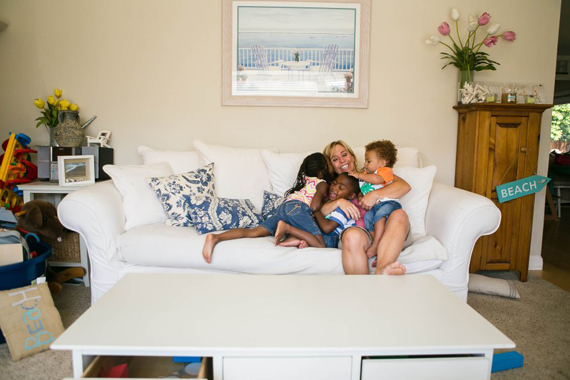
He was four days old when Julie got her first phone call that there was a child in need of a home. She had just recently completed her certification courses, taking the process step by step, still slightly in shock as to what she was potentially committing to. A single woman on a teacher’s salary — surely there must be better homes to place these children in? Julie had offered to take any child that needed a home. While most families may be on the foster to adopt track, or only want to foster older kids that could be more independent, Julie had the flexibility to open her home to those that may be hard to place.
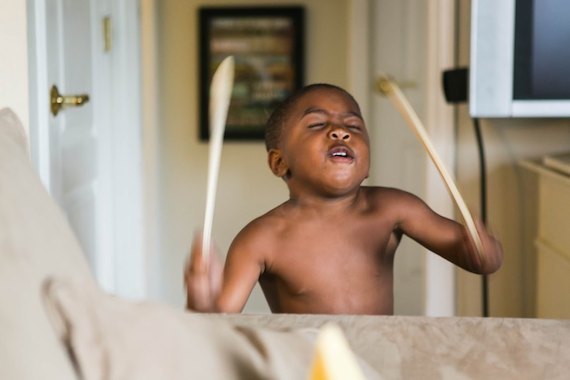
Zeke had spent the first four days of his life wide awake in a hospital bed. He was born addicted to meth and opiates, so the doctors had kept him in the hospital to monitor his withdrawal from the powerful drugs. Zeke’s mom was a sex worker and his Dad was her pimp. They were living in a hotel downtown, sharing the room with another sex worker who also happened to be pregnant and gave birth to her baby in that same hotel room.
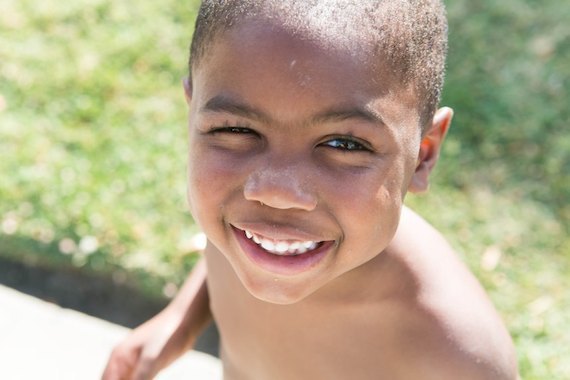
“Zeke’s mom was on too many drugs” Julie shared. “She wanted to love her son, but the drugs were too powerful. The saddest part was getting her info — they interview the parents to get info. She was a foster baby herself. She loved music, wanted to be a singer. Zeke was her only child that they knew of.”

The day that Julie got the phone call about Zeke, she was having her weekly Saturday brunch with her Mom. She had nothing: no crib, no diapers, no clothes, no bottles, not even a car seat to get him home. She said yes, and that day a seat was filled at her table (a seat that was hurriedly purchased at Target along with many other necessary items for a first time Mom without time for a baby shower). Not knowing if she would have Zeke for a day, a week, or for life, she simply said yes, and opened her home.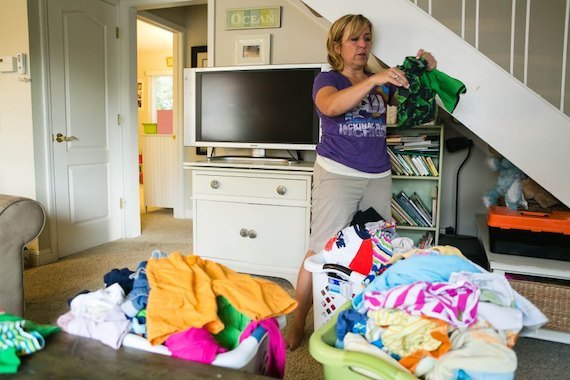
“His dad was a gang member.” Julie reflects on the last time she saw his Dad. “He had cigarette burns on his face from growing up. He was waiting for me on the steps to the court one day. I thought he was going to kill me. But he asked if I had family to support Zeke if I died. I said yes, I do. He expressed his desire to see the cycle of violence in his own life end. Told me his story. And that was it. I never saw him again. That was his closure.”
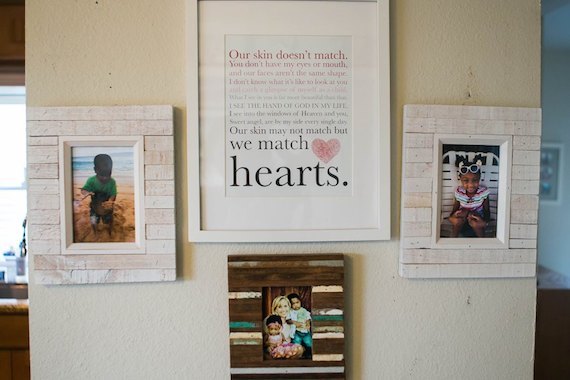
The first thing you notice about Julie’s home is its warmth, as though you’re instantly transported to the beach. Her sweet and no-longer-the-center-of-attention labrador retriever, Hudson, greets you at the door when you arrive. Walls are covered in family photos and reminders of the love that abounds in this home. Julie has Zyler on her hip, unloading groceries from the car while Zeke and Zoe are inside playing. Zoey is dancing while Zeke plays the drums on any object he can find that makes noise when it’s hit.
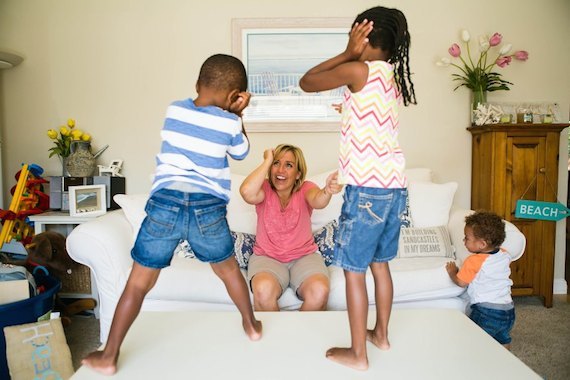
“The Foster system is very pro family reunification. They provide the birth parents with a lot more resources than they provide the foster parents — which is the way it should be,” Julie reflects on her experience. “But somehow it’s not breaking the cycles. I wish that more efforts were given to prevention — more community help. More awareness of drugs, or prostitution. Part of what they’re doing better is trying to prevent kids from going from one home to another. They’re looking for more permanent homes for kids, which is helping.”

Zoey started living with Julie when she was a year and a half. Born at 4 lbs, the doctors had told her birth mom to bring her back in a couple of weeks for a checkup. She was never brought back, and no one ever followed up with her. It wasn’t until a year and a half later that someone took Zoey to a neighborhood clinic because she wouldn’t stop crying.
At 18 months she weighed 16 lbs and wasn’t even on the growth charts. They thought that Zoey was on drugs because she was so unresponsive, and her little body was covered in scabies. Julie received a phone call, asking if she could take Zoey. Recognizing that she was a single Mom with a newborn already in her home, she asked them to call her back in 24 hours if they couldn’t find a placement. A day later, Julie got the second phone call that no one would take Zoey because her scabies were so contagious. Another seat was filled at Julie’s table that day. Zoey was diagnosed with ‘failure to thrive’ by the doctors, having never been fed solid food and unable to open her eyes in the sunlight because of a lack of outside exposure.

“As a teacher I’d seen foster care kids come through school with no resources. I don’t think I’m the solution, but I did want to do something. I think the foster community needs more awareness of the great need for foster families, resources… I would talk anyone I know into doing it. If they’re calling me — a single Mom on a teacher’s salary — to take a fourth and fifth kid? That shows you the lack of people and resources.”
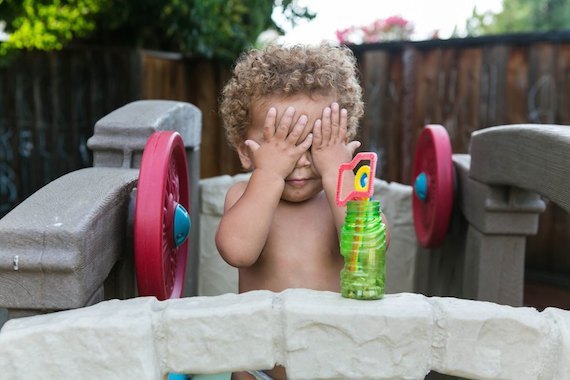
Zyler was born addicted to meth so the doctors took him right away. His Mom was in and out of jail for a long time — still is. She sells drugs and prostitutes herself to be able to afford them. Julie doesn’t know as much about his background, but acknowledges the deep connection between the drug trade and sex trafficking. She’s still fostering Zyler (after having adopted Zeke and Zoey) but believes that she’ll adopt him as the court learns more of his background.
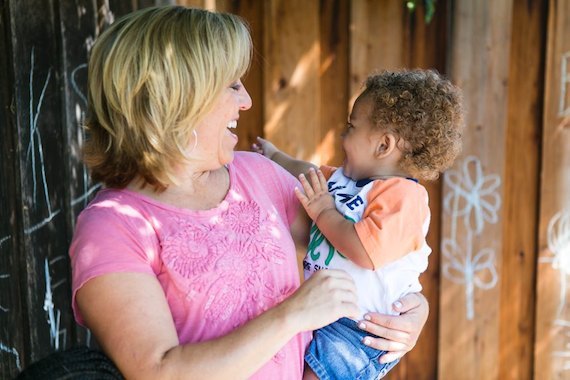
“I’ve learned that I’m stronger and braver than I thought. I had to face the fear of being single. Not being able to do it on my own, being left with these kids with no resources or help or anything. How will I deal with their issues? My fear was that I wouldn’t be able to handle them effectively like they deserve to be handled and treated. But I learned that there’s not a limit to how many kids I can love. It’s doable. You just make it work.”
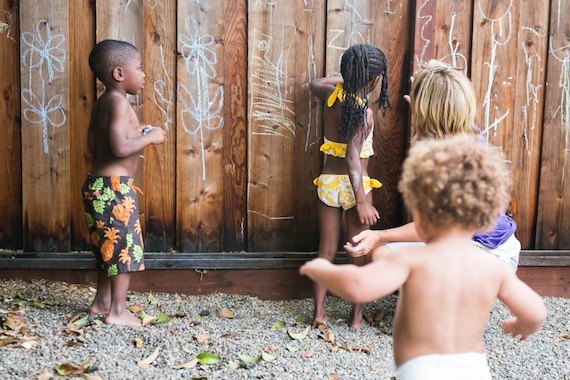
Fear seems to be the main hurdle for families thinking about fostering. There isn’t a lot of education about the needs of foster care families, or the resources available to them. It’s a hard system to navigate. There are respite resources available to foster care families, for example, but this service is rarely public knowledge while families are considering opening their homes to foster children. While there are social workers assigned to the children, there are no social workers assigned to the foster families themselves. There’s no overarching system that ties all of the resources together — it’s a system run by amazing people — but no one to tie it all together or provide a resource guide.
A ‘typical’ foster child, as Julie outlined, never truly knows where home is until they’re either adopted or placed in a foster family willing to foster them until they’re able to be reunited with their family. They push people away, knowing they are probably going to get rejected anyways. It’s a never ending cycle when there aren’t enough families to foster. Cultural barriers commonly provide another source of fear for families looking to foster.
Typically, families are much less afraid to take younger children than older ones. It’s difficult to predict the needs that a child will have or what life for a foster child is like — it’s so based on their situation — but Julie expresses the desire for it to become more normalized. Many foster care youth end up trafficked when they bounce between homes and don’t have a guardian invested in them and mentoring them. The need for a permanent person willing to provide a home for these youth is a great need.
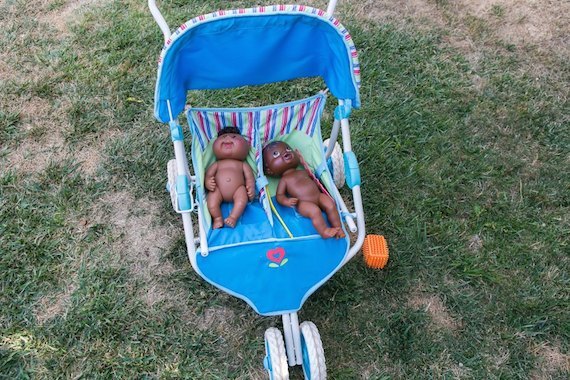
“I desire to keep their culture intact. Both black culture and foster culture. Both are part of who they are. Integrating the culture of fostering has already deeply rooted. We go to foster events, we’ll foster dogs, we’ll volunteer in the foster system as they grow up… fostering will be a part of our lives.”
Julie expressed her desire to be completely open with her children. Zoey is just starting to notice the skin color difference, and will start school soon. Without a Dad in the home and being exposed to children who are in traditional families, she knows these questions will begin to pop up as other kids ask questions and begin talking. But when they do ask, she plans to be completely open.
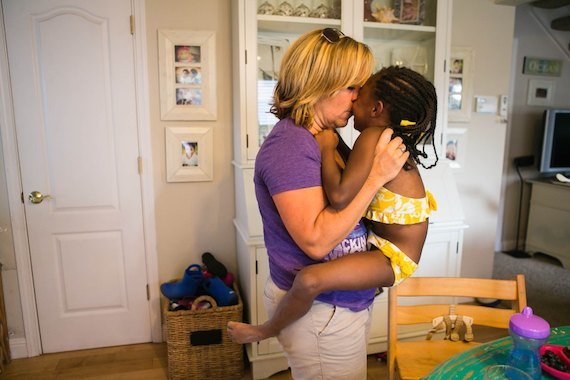
“My hope for these three is that they grow up to realize that it wasn’t a bad thing they were adopted. I hope they’ll want to help the system. And realize that they weren’t given up. They were born for a purpose and a meaning and their parents just couldn’t do it. They are just as wanted and loved, even though they came from a different place — their birth mom — they came to me — their heart mom. A single mom without a lot of money. I hope I can give them the resources to do what God put them on this planet to do.”
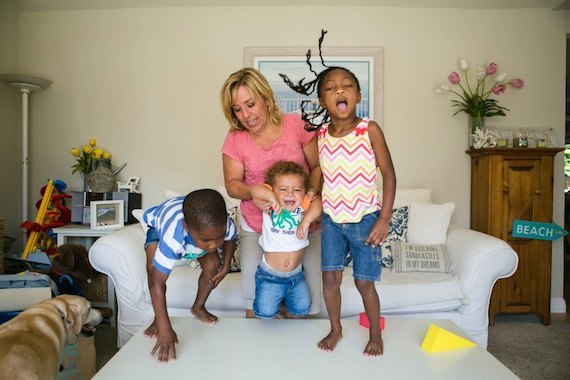
Rachel’s Note:
I have known Julie for almost a decade and have for a long time wanted to tell her story. It’s difficult to write about the foster care system from a narrative perspective while holding an awareness to the tension that exists between the foster care system and keeping children with their families. I am always an advocate for rehabilitating the entire family, and think that blood is strong and so important in creating bonds and connections and safety. I thank Zeke, Zoey and Zyler’s families for their bravery and sacrifice. Julie’s adoptions are all open, and she hopes that the Z’s will be able to have a relationship with their birth parents and siblings.

This article originally appeared in Love Matters of Huffington Post. To view the original article, click here.
Follow us on Facebook, Twitter, Instagram, and Pinterest.
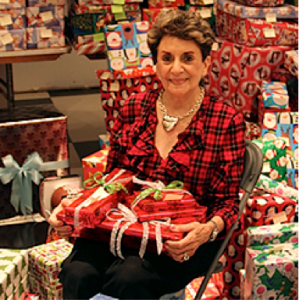 At Our Kids, holiday season means toy drive season! This year marked Bunchy Gertner’s 18th year organizing the toy drive and her 3rd year partnering with Our Kids. Through Bunch’s efforts and the support of thousands of donors in our community, every child in care age 0-17 years old receives a special gift for the holidays. Bunchy also makes sure that young adults who are exiting the foster system receive a special gift to prepare them for independent living: the Good Housekeeping gift includes basic necessities for their first apartments. Currently, there are approximately 4500 children in the dependency system in Miami-Dade and Monroe counties. We thank everyone who supports Bunchy’s Toy Drive, with a very special thank you to Bunchy for her tireless efforts!
At Our Kids, holiday season means toy drive season! This year marked Bunchy Gertner’s 18th year organizing the toy drive and her 3rd year partnering with Our Kids. Through Bunch’s efforts and the support of thousands of donors in our community, every child in care age 0-17 years old receives a special gift for the holidays. Bunchy also makes sure that young adults who are exiting the foster system receive a special gift to prepare them for independent living: the Good Housekeeping gift includes basic necessities for their first apartments. Currently, there are approximately 4500 children in the dependency system in Miami-Dade and Monroe counties. We thank everyone who supports Bunchy’s Toy Drive, with a very special thank you to Bunchy for her tireless efforts! On December 9th, Our Kids participated in the Miami Walk of Fame Annie event at Bayside Marketplace. Through our partnership with the City of Miami and Mayor Tomas Regalado, Our Kids was invited to participate in the festivities and raise awareness of the need for more quality foster homes in our community. Several Our Kids families attended the star-studded event, where the film and cast received their own star on the Miami Walk of Fame. Thank you to the City of Miami, the Miami Walk of Fame, and Sony Pictures for your support!
On December 9th, Our Kids participated in the Miami Walk of Fame Annie event at Bayside Marketplace. Through our partnership with the City of Miami and Mayor Tomas Regalado, Our Kids was invited to participate in the festivities and raise awareness of the need for more quality foster homes in our community. Several Our Kids families attended the star-studded event, where the film and cast received their own star on the Miami Walk of Fame. Thank you to the City of Miami, the Miami Walk of Fame, and Sony Pictures for your support! On Friday, November 21, 2014, we hosted our annual National Adoption Day event, sponsored by The Children’s Trust. The event took place at the Miami Children’s Museum where exhibits were turned into mock courtrooms and 43 adoptions were finalized, creating 38 Forever Families. Each family received an annual membership to the Miami Children’s Museum so they can return throughout the year and enjoy all that the museum has to offer. Families also received gift cards to Publix and Toys R’ Us, on behalf of the family and friends of Carla Merhige and Lisa Merhige Knight. Thank you to The Children’s Trust and everyone who helped make this day special for our families, it would not be possible without your hard work and dedication.
On Friday, November 21, 2014, we hosted our annual National Adoption Day event, sponsored by The Children’s Trust. The event took place at the Miami Children’s Museum where exhibits were turned into mock courtrooms and 43 adoptions were finalized, creating 38 Forever Families. Each family received an annual membership to the Miami Children’s Museum so they can return throughout the year and enjoy all that the museum has to offer. Families also received gift cards to Publix and Toys R’ Us, on behalf of the family and friends of Carla Merhige and Lisa Merhige Knight. Thank you to The Children’s Trust and everyone who helped make this day special for our families, it would not be possible without your hard work and dedication.
















